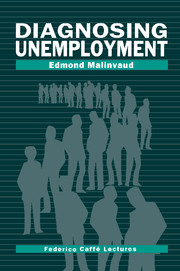Book contents
- Frontmatter
- Contents
- Preface to the Caffé Lectures 1990
- Acknowledgements
- Introduction
- 1 Expert diagnosis
- 2 Analysis and forecasting: their respective roles in mastering our destinies
- 3 From statistics to projections
- 4 Diagnosing unemployment trends
- 5 The Beveridge curve
- 6 Real wages and employment – a decade of analysis
- 7 Profitability and factor demands under uncertainty
- Index
6 - Real wages and employment – a decade of analysis
Published online by Cambridge University Press: 06 July 2010
- Frontmatter
- Contents
- Preface to the Caffé Lectures 1990
- Acknowledgements
- Introduction
- 1 Expert diagnosis
- 2 Analysis and forecasting: their respective roles in mastering our destinies
- 3 From statistics to projections
- 4 Diagnosing unemployment trends
- 5 The Beveridge curve
- 6 Real wages and employment – a decade of analysis
- 7 Profitability and factor demands under uncertainty
- Index
Summary
I feel greatly honoured to speak here in memory of Josiah Stamp who wanted to promote the development of socio-economic statistics and the progress of economics, two objectives that were also mine. The Lecture should have as its subject ‘the application of economics or statistics to a practical problem of general interest’ the members of the Stamp board moreover suggested that I select a theme related to employment. Hoping to comply with their wishes, I intend to discuss what we now know about the role of real wages in the determination of employment.
This is, as we shall see in a moment, an old problem and one about which various schools of economists often disagreed. Ten years ago it again came to the forefront when European wages were said to be too high; the poor employment performances in Europe were said to be caused in part by a wage gap. The question was studied and extensively discussed. Was it solved? Opinions probably vary, but an independent observer would, I am afraid, conclude that in economics fashions are shortlived and interest quickly shifts from one subject to another; the wage gap hypothesis went out of fashion before it was either proved or disproved. It falls to me to remark that the same economist can simultaneously discard the hypothesis and make in his analysis of employment assumptions that, if true, would imply the validity of the hypothesis.
- Type
- Chapter
- Information
- Diagnosing Unemployment , pp. 116 - 136Publisher: Cambridge University PressPrint publication year: 1994



